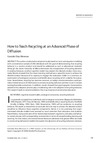Identificador persistente para citar o vincular este elemento:
https://accedacris.ulpgc.es/jspui/handle/10553/75575
| Título: | How to teach recycling at an advanced phase of diffusion | Autores/as: | Díaz Meneses, Gonzalo | Clasificación UNESCO: | 530802 Comportamiento del consumidor | Palabras clave: | Cognitive-Based Models Ecological Conscience Recycling Behavior |
Fecha de publicación: | 2006 | Publicación seriada: | Journal of Environmental Education | Resumen: | The author conducted an empirical study based on structural equation modeling with a convenience sample of 246 individuals with the goal of demonstrating that recycling behavior is a routine conduct and should be addressed as such in educational materials. Although the classic hierarchy of effects dominates the interpretation of recycling behavior in existing literature, another cognitive model may explain this desired conduct more accurately. Results showed that the classic learning method was a powerful route to achieve the desired conduct because of its capacity to engage the evaluation holder in a conscious re-examination of ecological conscience and beliefs about recycling which underlie the evaluations. Nevertheless, recycling has become common, so today's environmentalists could provide a limited amount of information to activate recycling behavior and then to set in motion existing favorable evaluations. In addition, results showed that psychographic characteristics related to this adoption process play a moderating role in the adoption of recycling behavior. This research leads to recommendations that may improve environmental education. Copyright © 2006 Heldref Publications. | URI: | https://accedacris.ulpgc.es/handle/10553/75575 | ISSN: | 0095-8964 | DOI: | 10.3200/JOEE.37.4.19-32 | Fuente: | Journal of Environmental Education[ISSN 0095-8964],v. 37 (4), p. 19-32, (Junio 2006) |
| Colección: | Artículos |
Los elementos en ULPGC accedaCRIS están protegidos por derechos de autor con todos los derechos reservados, a menos que se indique lo contrario.
